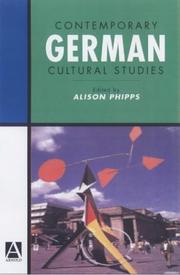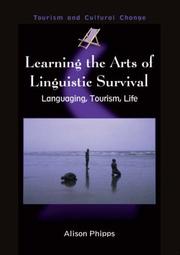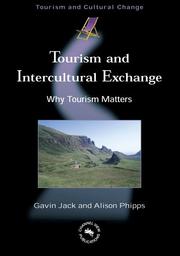| Listing 1 - 10 of 29 | << page >> |
Sort by
|

ISBN: 0340764023 0340764015 Year: 2002 Publisher: London Arnold
Abstract | Keywords | Export | Availability | Bookmark
 Loading...
Loading...Choose an application
- Reference Manager
- EndNote
- RefWorks (Direct export to RefWorks)
As the study of German comes under the influence of other disciplinary approaches, the notion of culture has evolved from one focused largely on the arts to an approach which understands culture as the way of life of a people or a period. This introductory book examines contemporary German culture not only in the context of its intellectual life--the media, the arts, political figures and events --but also in the context of the theories and methodologies of cultural studies, anthropology, and sociology. Providing a critical assessment of the diversity of German culture and identity, Contemporary German Cultural Studies focuses on the contemporary period and at the same time considers the influence of the past and forces such as globalization. The emphasis is on the interpretation and analysis of the varieties of German cultures--the processes, the practices and the performances. The book also explores intercultural issues, including the implications of studying German culture from an anglophone perspective.
German literature --- History of civilization --- Germany --- Allemagne --- Intellectual life --- Civilization --- Social life and customs --- Vie intellectuelle --- Civilisation --- Moeurs et coutumes --- Civilization.
Book
ISBN: 9780745648880 9780745648873 Year: 2014 Publisher: Cambridge : Polity,
Abstract | Keywords | Export | Availability | Bookmark
 Loading...
Loading...Choose an application
- Reference Manager
- EndNote
- RefWorks (Direct export to RefWorks)
Human body --- Women --- Feminism. --- Corps humain --- Femmes --- Féminisme --- Social aspects. --- Social conditions. --- Aspect social --- Conditions sociales --- Féminisme

ISBN: 1845410548 9781845410544 9781845410537 184541053X 9781845410551 1845410556 128070537X 9786610705375 1845413334 Year: 2006 Publisher: Bristol, UK Blue Ridge Summit, PA
Abstract | Keywords | Export | Availability | Bookmark
 Loading...
Loading...Choose an application
- Reference Manager
- EndNote
- RefWorks (Direct export to RefWorks)
In this ground-breaking contribution to the study of tourism and languages, Alison Phipps examines what happens when tourists learn to speak other languages. From ordering a coffee to following directions she argues for a new perception of the relationship between tourism and languages from one based on the acquisition of basic, functional skills to one which sustains and even strengthens intercultural dialogue. The twelve chapters comprising this book tell stories of the experience of learning and speaking tourist languages. Drawing on a range of disciplines Alison Phipps takes the reader on a journey through risk, way finding, mistakes, laughter, conversations and the imagination. She provides rich descriptions of the world of language learning which has remained invisible to mainstream studies of language education, existing as it does on the margins of educational life. She shows how tourism is shaped by the learning experiences of everyday life. Languages, she argues passionately, fundamentally change the nature of perception, dwelling and relationships to other people and the world. This book will be essential reading for all those interested in tourism studies and in modern languages education. It is a timely study, coming at time of crisis in languages, as English exerts its power as a world language and as a dominant language of tourism. Learning the Arts of Linguistic Survival: Languaging, Tourism, Life will also be of interest to anthropologists, linguists, geographers, sociologists and those studying education.
Intercultural communication. --- Second language acquisition. --- Sociolinguistics. --- Tourism. --- Tourists. --- Language and languages --- Tourism --- Languages & Literatures --- Philology & Linguistics --- Study and teaching --- Taalgebruik in het toerisme --- Toerisme --- discoursanalyse --- Study and teaching. --- Taalgebruik in het toerisme. --- discoursanalyse. --- Holiday industry --- Operators, Tour (Industry) --- Tour operators (Industry) --- Tourism industry --- Tourism operators (Industry) --- Tourist industry --- Tourist trade --- Tourist traffic --- Travel industry --- Visitor industry --- Foreign language study --- Economic aspects --- Service industries --- National tourism organizations --- Travel --- Language and education --- Language schools --- Discoursanalyse. --- Language and languages Study and teaching --- experience. --- intercultural dialogue. --- language learning. --- languaging. --- tourism and languages. --- tourism. --- tourist languages.
Book
ISBN: 1788924061 9781788924061 178892407X 9781788924078 9781788924085 1788924088 9781788924054 9781788924047 1788924045 1788924053 Year: 2019 Publisher: Bristol Blue Ridge Summit
Abstract | Keywords | Export | Availability | Bookmark
 Loading...
Loading...Choose an application
- Reference Manager
- EndNote
- RefWorks (Direct export to RefWorks)
This book presents the first ever comprehensive overview of national laws recognising sign languages, the impacts they have and the advocacy campaigns which led to their creation. It comprises 18 studies from communities across Europe, the US, South America, Asia and New Zealand. They set sign language legislation within the national context of language policies in each country and show patterns of intersection between language ideologies, public policy and deaf communities' discourses. Each chapter, grounded in scholarship by deaf scholars, describes a deaf community's expectations and hopes for legal recognition and the type of sign language legislation achieved. The chapters also discuss the strategies used in achieving the passage of the legislation, as well as an account of barriers confronted and surmounted (or not) in the legislative process. It will be of interest to language activists in the fields of sign language and other minority languages, policymakers and researchers in deaf studies, sign linguistics, sociolinguistics, human rights law and applied linguistics.
Imperialism and philology. --- Decolonization --- Sovereignty --- Autonomy and independence movements --- Colonization --- Postcolonialism --- Philology and imperialism --- Philology --- Social aspects. --- Post-colonial scholarship. --- anthropology. --- applied theatre. --- autoethnography. --- borders. --- colonial languages. --- decolonisation. --- indigenous knowledge. --- Entkolonialisierung. --- Mehrsprachigkeit.
Book
ISBN: 9781526155801 9781526147172 152615580X Year: 2020 Publisher: Manchester: Manchester University press,
Abstract | Keywords | Export | Availability | Bookmark
 Loading...
Loading...Choose an application
- Reference Manager
- EndNote
- RefWorks (Direct export to RefWorks)
The Me Too movement, started by Black feminist Tarana Burke in 2006, went viral as a hashtag eleven years later after a tweet by white actor Alyssa Milano. Mainstream movements like #MeToo have often built on and co-opted the work of women of colour, while refusing to learn from them or centre their concerns. Far too often, the message is not 'Me, Too' but 'Me, Not You'. Alison Phipps argues that this is not just a lack of solidarity. Privileged white women also sacrifice more marginalised people to achieve their aims, or even define them as enemies when they get in the way. Me, not you argues that the mainstream movement against sexual violence expresses a political whiteness that both reflects its demographics and limits its revolutionary potential. Privileged white women use their traumatic experiences to create media outrage, while relying on state power and bureaucracy to purge 'bad men' from elite institutions with little concern for where they might appear next. In their attacks on sex workers and trans people, the more reactionary branches of this feminist movement play into the hands of the resurgent far-right.
Sociology of the family. Sociology of sexuality --- Feminism --- Sexually transgressive behavior --- Whiteness --- Book --- Discrimination
Book
Year: 2014 Publisher: Cambridge Polity Press
Abstract | Keywords | Export | Availability | Bookmark
 Loading...
Loading...Choose an application
- Reference Manager
- EndNote
- RefWorks (Direct export to RefWorks)
Het politieke discours rond 4 centrale thema’s wordt kritisch bekeken: (1)seksueel geweld, (2)gender & islam, (3)prostitutie & sekswerk, en (4)bevalling & borstvoeding. Termen zoals ‘agency’ en ‘empowerment’ werden gekaapt en worden nu tégen het kritische feminisme gebruikt. Zelfverklaarde progressieven namen het in de media op voor DSK, Julian Assange en Roman Polanski als ‘slachtoffers van publieke bekladdingoperaties’, maar zij die het geweld ondergingen werden vergeten. Bij kritiek op de islam wil men enerzijds de vrouw maar al te graag in een slachtofferrol duwen (neoconservatief), terwijl men anderzijds respect voor cultuurverschillen wil benadrukken (neoliberaal). Intussen gaan schadelijke praktijken zoals genitale verminking gewoon door. Wat betreft prostitutie gaat men volledig voorbij aan de problematische seks-consumptiecultuur, want neoliberalen zien zulk werk als een “vrije keuze” en als deel van iemands identiteit. Tenslotte spelen acties voor “natural birth”-actiegroepen en borstvoedingsbewegingen in de kaart van een neoliberale gezondheidszorg.
Political philosophy. Social philosophy --- Islam --- Sociology of the family. Sociology of sexuality --- Sociology of work --- Political sociology --- Sociology --- Politics --- Physiology: reproduction & development. Ages of life --- Human physiology --- Gynaecology. Obstetrics --- Pragmatics --- Feminism --- Gender --- Discourse analysis --- Neoliberalism --- Motherhood --- Sex industry --- Sexually transgressive behavior --- Theory --- Female body --- Childbirth --- Book --- Breast feeding --- Conservatism --- Europe --- United States of America
Book
Year: 2008 Publisher: Stoke on Trent Trentham Books
Abstract | Keywords | Export | Availability | Bookmark
 Loading...
Loading...Choose an application
- Reference Manager
- EndNote
- RefWorks (Direct export to RefWorks)
Sinds de jaren zeventig worden in het Verenigd Koninkrijk acties en campagnes ondernomen om meer vrouwen en meisjes aan te zetten om een studie of een baan in wetenschap en technologie te kiezen. Deze publicatie geeft een overzicht van deze campagnes en initiatieven . Geput werd uit archiefmateriaal en interviews om de doelstellingen en de resultaten van deze campagnes te onderzoeken.
Science --- Sociology of minorities --- Sociology of occupations --- Social policy --- Labour economics --- Study methods --- Engineering sciences. Technology --- Equal opportunities --- Sexual division of labour --- Choice of study --- Technology sector --- Technology --- Academic sector --- Career choice --- Book --- Empowerment --- Great Britain
Book
ISBN: 9789284620388 Year: 2017 Publisher: Brussels European Parliament. Policy Department for Structural and Cohesion Policies
Abstract | Keywords | Export | Availability | Bookmark
 Loading...
Loading...Choose an application
- Reference Manager
- EndNote
- RefWorks (Direct export to RefWorks)
Cultural work with refugees has a long history. It is a contentious area. Instrumental approaches to cultural work with refugees raise significant issues. This briefing outlines the contentions, provides a theoretical basis for the work, gives leading examples of cultural work with refugees, including work that promotes intercultural understanding and work that promotes fear. It outlines key findings and recommendations, which have a substantial focus on ethical engagement, aesthetic importance and societal wellbeing.
Book
ISBN: 1526147181 152615272X 9781526152725 1526147173 9781526147172 Year: 2020 Publisher: Manchester
Abstract | Keywords | Export | Availability | Bookmark
 Loading...
Loading...Choose an application
- Reference Manager
- EndNote
- RefWorks (Direct export to RefWorks)
The Me Too movement, started by Black feminist Tarana Burke in 2006, went viral as a hashtag eleven years later after a tweet by white actor Alyssa Milano. Mainstream movements like #MeToo have often built on and co-opted the work of women of colour, while refusing to learn from them or centre their concerns. Far too often, the message is not 'Me, Too' but 'Me, Not You'. Alison Phipps argues that this is not just a lack of solidarity. Privileged white women also sacrifice more marginalised people to achieve their aims, or even define them as enemies when they get in the way. Me, not you argues that the mainstream movement against sexual violence expresses a political whiteness that both reflects its demographics and limits its revolutionary potential. Privileged white women use their traumatic experiences to create media outrage, while relying on state power and bureaucracy to purge 'bad men' from elite institutions with little concern for where they might appear next. In their attacks on sex workers and trans people, the more reactionary branches of this feminist movement play into the hands of the resurgent far-right.
Minority women --- Social conditions. --- #MeToo. --- Capitalism. --- Colonialism. --- Far right. --- Feminism. --- Media. --- Race. --- Rape. --- Sexual harrassment. --- Transgender.

ISBN: 1845410181 1845410173 9786610627882 1280627883 184541019X 9781845410193 9781845412654 1845412656 9781280627880 9781845410179 9781845410186 Year: 2005 Publisher: Bristol, UK Blue Ridge Summit, PA
Abstract | Keywords | Export | Availability | Bookmark
 Loading...
Loading...Choose an application
- Reference Manager
- EndNote
- RefWorks (Direct export to RefWorks)
This book asks the question; why is it that tourism matters? It looks at how it is we do tourism and learn to be tourists when we are on holiday. Tourism is a dynamic way of being that may facilitate or hinder intercultural exchange. The ways in which we do tourism and the places in which we are tourists raise practical, material and emotional questions about tourist life. This book draws on both empirical work and a range of theoretical frameworks, arguing that tourism matters precisely because of the lessons it can teach us about living everyday life with others.
#KVHA:Toerisme --- #KVHA:Interculturele uitwisseling --- Travelers. --- Cultural relations --- Tourism --- Travelers --- Cultural exchange --- Intercultural relations --- Intellectual cooperation --- International relations --- Psychological aspects --- Psychology --- Cultural relations. --- Tourism. --- Geography --- Earth & Environmental Sciences --- Travel & Tourism --- Psychological aspects. --- Psychology. --- Travellers --- Voyagers --- Wayfarers --- Persons --- Voyages and travels --- Holiday industry --- Operators, Tour (Industry) --- Tour operators (Industry) --- Tourism industry --- Tourism operators (Industry) --- Tourist industry --- Tourist trade --- Tourist traffic --- Travel industry --- Visitor industry --- Service industries --- National tourism organizations --- Travel --- Economic aspects
| Listing 1 - 10 of 29 | << page >> |
Sort by
|

 Search
Search Feedback
Feedback About UniCat
About UniCat  Help
Help News
News